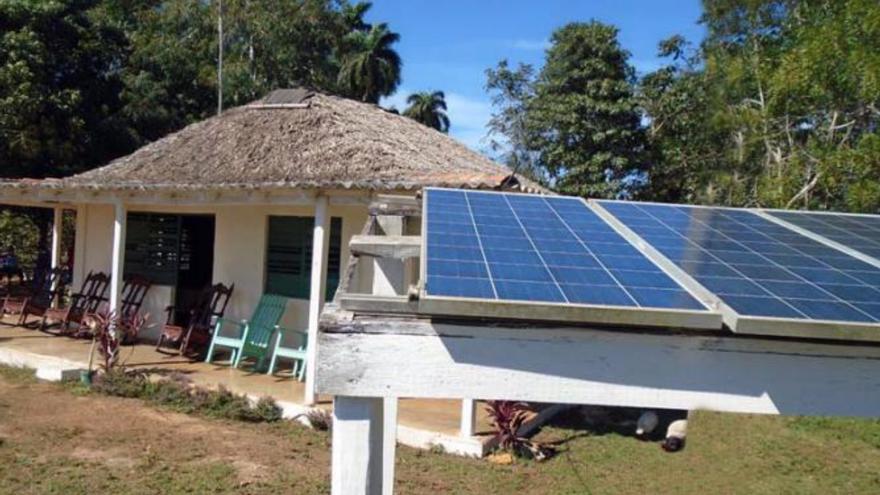
![]() 14ymedio, Havana, 18 December 2020 — The increase in the electricity rates, which starts with the monetary unification on January 1, has reminded Cubans recently that a good alternative could be the installation of solar panels, which were promoted so much a few years ago by the Government. The reality is, however, that individuals cannot get a hold of this technology.
14ymedio, Havana, 18 December 2020 — The increase in the electricity rates, which starts with the monetary unification on January 1, has reminded Cubans recently that a good alternative could be the installation of solar panels, which were promoted so much a few years ago by the Government. The reality is, however, that individuals cannot get a hold of this technology.
The Cuban Electricity Union (UNE) itself has acknowledged this in the State newspaper Granma this Thursday, where it states that “the production of photovoltaic panels has not been guaranteed to make them available to the retail network for sale to the population.”
Despite the fact that the Ministry of Science, Technology and Environment has a Solar Energy Research Center, several calls from 14ymedio to this official entity found no official who was able to specify the way in which an individual could acquire solar panels to generate their electricity.
“We have nothing to do with the sale of these devices, the related company is the Electronic, Automation and Communications Industry Group (Copextel) but so far it has only been able to sell solar water heaters,” clarified an employee of the ministry.
The Rensol brand heaters began to be sold at the end of 2019 to individuals and in national currency at the price of 2,945 Cuban pesos (CUP), in a pilot test that included 7,000 devices. But, the commercialization of this equipment has not continued to expand and currently they can hardly be found in the informal market at a cost that exceeds 600 Cuban convertible pesos (almost five times the original price).
“The Program for the Development of renewable energy sources and energy efficiency conceives the sale of panels to individuals,” clarified the UNE, stating that even “the rules for the implementation of this sale are in force.”
The company regrets that its industry, “due to the economic-financial difficulties” it is going through, cannot take on sales to the population. “Currently, the photovoltaic systems installed in the residential sector are very few and were imported by individuals,” he added.
The UNE, which went to the Granma newspaper to answer “more frequent” questions about the new electricity rates, and also explained the advantages of the devices.
According to the data provided by the UNE, 5 solar panels of 260 watts each are required to cover the energy needs of a home that has an average monthly consumption of 185 kWh.
One of the users who read the publication sent a question to the electricity company in the comments section without receiving a response: “What would happen if a person is capable of generating, through solar panels or some other ecological means, an amount greater than the consumption of their home? Would the UNE be able to take on this private generation and pay for it?”
In 2019, through Decree Law 345, the sale of surplus electricity generated by private producers from this type of source was authorized. But the provision does not modify the state monopoly of the Electricity Union, which is the only one authorized to buy, distribute and commercialize energy of private origin.
A year earlier, at the 35th International Havana Fair, it was announced with great fanfare that the Spanish company Assyce Yield Energía SA and the German EFF Solar SA would install solar panels to generate 100 megawatt hours of electricity in the western provinces of Pinar del Río, Artemisa, Mayabeque and Matanzas.
It was expected, the authorities said at the time, that both companies would begin to provide electricity to the National Electroenergy System in 2018, as explained by the general director of Foreign Investment of the Ministry of Foreign Trade and Foreign Investment, Déborah Rivas.
This newspaper has tried to contact Assyce, but its business phone number has been disconnected.
Decree Law 345 also established that business systems and forms of private management dedicated to tourism could carry out “technical and economic analysis” to “install technologies that take advantage of renewable energy sources.”
The new legislation, however, did not come accompanied by flexibilizations from the General Customs of the Republic for the importation by the private sector of equipment to produce clean energy, such as photovoltaic panels.
Importing solar panels to Cuba is not exactly cheap, as they are items that require the payment of a considerable customs tax. According to their generation power, the rates vary between 200 and 1,000 pesos for panels of 900 watts up to 15 kilowatts. Customs has reiterated on several occasions that travelers can bring into the country only one panel on each trip.
____________
COLLABORATE WITH OUR WORK: The 14ymedio team is committed to practicing serious journalism that reflects Cuba’s reality in all its depth. Thank you for joining us on this long journey. We invite you to continue supporting us by becoming a member of 14ymedio now. Together we can continue transforming journalism in Cuba.
